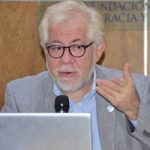 Giancarlo Summa, a Visiting Fellow at LSE, explains why the WHO’s annual assembly earlier this week might have been a turning point in international relations, as we undergo a major reshuffle of the multilateral world order and see the rise of the far-right as a significant global actor.
Giancarlo Summa, a Visiting Fellow at LSE, explains why the WHO’s annual assembly earlier this week might have been a turning point in international relations, as we undergo a major reshuffle of the multilateral world order and see the rise of the far-right as a significant global actor.
The annual assembly of the World Health Organization, usually a subdued diplomatic event that doesn’t stir much external attention, was breaking news all over the planet earlier this week – and not just because of the obvious attention generated by the COVID-19 pandemic. On the assembly’s opening day, 18 May, president Donald Trump made public in a tweet a letter he had just sent to the WHO Director General, containing a frontal attack against the Organization because of alleged “failings” in the handling of the pandemic, accusations of excessive closeness to China, and the explicit threat that the United States will permanently cut all financial contributions and leave the WHO unless it commits to “major substantive improvements in the next 30 days.”
The Chinese response, delivered by president Xi Jinping in a speech online, was very different, in tone and contents. He praised WHO’s “major contribution in leading and advancing the global response to COVID-19” and announced that Beijing would donate $2 billion over two years to fight the pandemic and would also dispatch doctors and medical supplies to Africa.
What happened at the WHO assembly may be remembered by future historians as a turning point in international relations. In the year that marks the 75th anniversary of the end of the Second World War and of the creation of the United Nations, we are seeing a major reshuffle of the multilateral world order – the system of global governance institutions originally promoted by the United States and the allied nations that defeated Nazi fascism. The system is in crisis and appears increasingly fragile, as it is being eroded from within by some of the very same countries that for decades, with all the ups and downs, worked together to build a framework of rules and values that were accepted by most of the international community.
Not by chance, the crisis coincides with the emergence of the far-right as a major global actor, which has progressively moved from the margins of political life to positions of power in several crucial countries (the United States, Brazil, Hungary, Poland, India, Philippines and Turkey, among others). Traditionalists, who have profoundly shaped the far-right ideological debate in the last decades, as a recent book by Benjamin Teitelbaum effectively shows, tend to focus on criticism of modernity, intended in terms of secularism, democracy, and globalization.
The continuous expansion of the multilateral system’s agenda beyond the United Nations’ narrow initial peace-keeping mission (“to save succeeding generations from the scourge of war”) has created a stark contrast between the practice of multilateralism and the image of ideal societies pursued by far-right movements and political leaders. The very concepts of human rights (including sexual, reproductive, and LGBTI rights), gender and racial equality, global mobility, and sustainable development collide with a political project that, in broad strokes, exalts a retrospective nationalistic utopia based on the traditional values of religion, motherland, and family. The idea of progress in terms of development, liberty and plurality is the antithesis of a world vision based on the aspiration to the return to a glorified golden age of clear social, racial and geographical hierarchies, and uncontested patriarchal dominance.
Over the decades, most international organizations – and especially so the United Nations – have made a real effort to evolve from a North-centric and strictly nation-based worldview, to painfully learn how to consider different cultural, political and social experiences with respect and interest. On the opposite trench, right-wing leaders of all latitudes have resorted more and more to discourses and political practices grounded on unashamed religion-based nationalism and otherness – and on incessant efforts to control the public narrative on both social media and legacy media. Now, facing the emergence of new significant actors that challenge the status quo, right-wing authoritarian leaders and movements seem inclined to favour the progressive erosion of a multilateral system they cannot entirely control or steer.
It is a process that Stefanie Walters has defined as mass-based disintegration: disintegration, because it aims to partly or fully withdraw from the agreed rules of international institutions; and mass-based, because it is often based on a strong domestic support, either expressed through a referendum vote (such as Brexit) or as part of a candidate’s successful election campaign. Thus, mass-based disintegration is a process that starts at the national level, but has international implications as soon as a government, based on its internal constituency, puts pressure on the other Member States to modify the rules of an international organization, or unilaterally withdraws from specific rules (or from the entire institution).
What happened this week at the WHO assembly is a clear demonstration of such a dangerous trend. It is too early to know whether the Chinese government will really try to occupy the space in the international system that the Trump administration has been increasingly abandoning; much will of course depend on the results of next US presidential elections in November. But the danger posed by right-wing authoritarian leaders to the very fabric of the multilateral world order will not disappear even if Joe Biden will become the next POTUS.
For all who believe in multilateralism as the only way to tackle the global challenges of our time – from the climate crisis to pandemics, from mass migrations to civil wars, from tax avoidance of transnational companies to mega data control – it is imperative to identify and analyse the anti-multilateralism discursive narratives, political actions, and communication tools used by far-right leaders and movements in different countries, as well as their international connections. In the case of the COVID-19 emergency, right-wing leaders worldwide have often followed similar scripts: playing down the danger, opposing lockdown measures, trying to grab more power, praising the untested effect of hydroxychloroquine, and putting emphasis on the primacy of economic recovery over health concerns. Or all the above, as in the case of Brazil’s Jair Bolsonaro.
On the same day of the high-octane exchange between the Chinese and the U.S. leaders, the United Nations Secretary-General Antonio Guterres also addressed the WHO assembly over a video link. “The COVID-19 pandemic has demonstrated our global fragility. […] Different countries have followed different, sometimes contradictory, strategies and we are all paying a heavy price,” he said. “Many countries have ignored the recommendations of the World Health Organization. As a result, the virus has spread across the world and is now moving into the Global South, where its impact may be even more devastating.”
Demagogues and authoritarian leaders all over the world keep building their political fortunes on divisionary politics. It’s time for multilateralists to react. To paraphrase the Churchillian aphorism about democracy, the multilateral world order, with the United Nations at its centre, is the most imperfect and ineffectual of all possible orders — except all other forms of addressing global issues that have been ever tried.
This article represents the views of the author and not the position of the Media@LSE blog, nor of the London School of Economics and Political Science, and does not represent any kind of endorsement from the United Nations.




